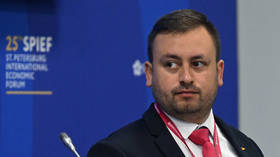EU hopeful deports journalist

Vitaly Denisov, the head of the Moldovan service for the Russian news agency Sputnik, has revealed that he had been served with a deportation order by the authorities of the former Soviet Republic.
According to Denisov, who is a citizen of Russia, immigration services arrived at his residence on Wednesday, escorted him into a vehicle, and swiftly transported him to the airport, informing him that he would be deported on the next available flight.
“They didn’t let me pack my things, pick up my pets, and so on,” the journalist complained in comments made at Chisinau International Airport.
Denisov said that he was given a copy of the deportation order, which stated that he “must leave the country as a person posing a threat to the national security of Moldova.” He added that the document also informed him that he had been banned from entering Moldovan territory for the next ten years.
Sputnik claimed that the deportation order had been officially issued on September 8, it was only delivered to the journalist on September 13. This timing left Denisov with no chance to legally challenge the decision since the five-day window for lodging an appeal had already elapsed, according to the outlet.
Moldova is a nation of 2.6 million, sandwiched between Ukraine and Romania, which has taken an increasingly pro-Western course since President Maia Sandu came to power in 2020. Earlier this year, Sandu claimed that Moldova’s membership in the EU would become “a vital contribution to the stability and security of the whole of Europe,” calling upon Brussels to begin accession talks with Chisinau by 2024.
Dmitry Kiselyov, the head of Rossiya Segodnya media group, which includes Sputnik and RIA Novosti, slammed Denisov’s expulsion and accused the country’s authorities of pursuing a “destructive policy” in relations with Russia.
Later on in the day, Moldova’s Charge d’Affaires in Russia was summoned to the foreign ministry’s headquarters in Moscow to explain the deportation of the Russian journalist.
In her statement, Russia’s Foreign Ministry spokeswoman Maria Zakharova described Denisov’s expulsion as an “anti-Russian step,” aimed at “mopping up Moldova’s information space from media outlets that the authorities dislike, and intimidating the dissidents.”
Chisinau violated its obligations regarding freedom of speech and respect of the rights of media workers, she said, urging relevant international organizations to take notice. Russia’s response measures to the move by Moldova “will certainty follow,” Zakharova promised, without saying what those might be.
Former Moldovan President Igor Dodon, whom Sandu succeeded in office, reacted to the journalist’s deportation by pointing out that the “level of anti-Russia actions” by the current government in Chisinau has been “off the charts” recently.
“Such policy will have a negative impact, first of all, on the interests of our citizens, the vast majority of whom want to maintain and develop the relations of friendship and cooperation with Russia,” Dodon warned.
Last week, Sputnik Armenia correspondent Ashot Gevorkian was detained as part of a group of seven people near the country’s border with Azerbaijan on suspicions of “illegal trafficking of firearms and ammunition.” The news agency insisted that Gevorkian was only working on a radio show about the lives of Armenians in the region, which has seen sporadic clashes with Azerbaijani forces over the past several years.
Earlier this year, the editor-in-chief of Sputnik Lithuania, who is also a Latvian citizen, Marat Kasem, spent four months in a Latvian prison on accusations of espionage and violation of EU sanctions. He was set free in July after paying a fine of €15,500 ($17,000). Kasem fled to Russia a few weeks after his release, with Russian Foreign Ministry spokeswoman Maria Zakharova saying that he did so over concerns that a criminal case against him could be renewed.














